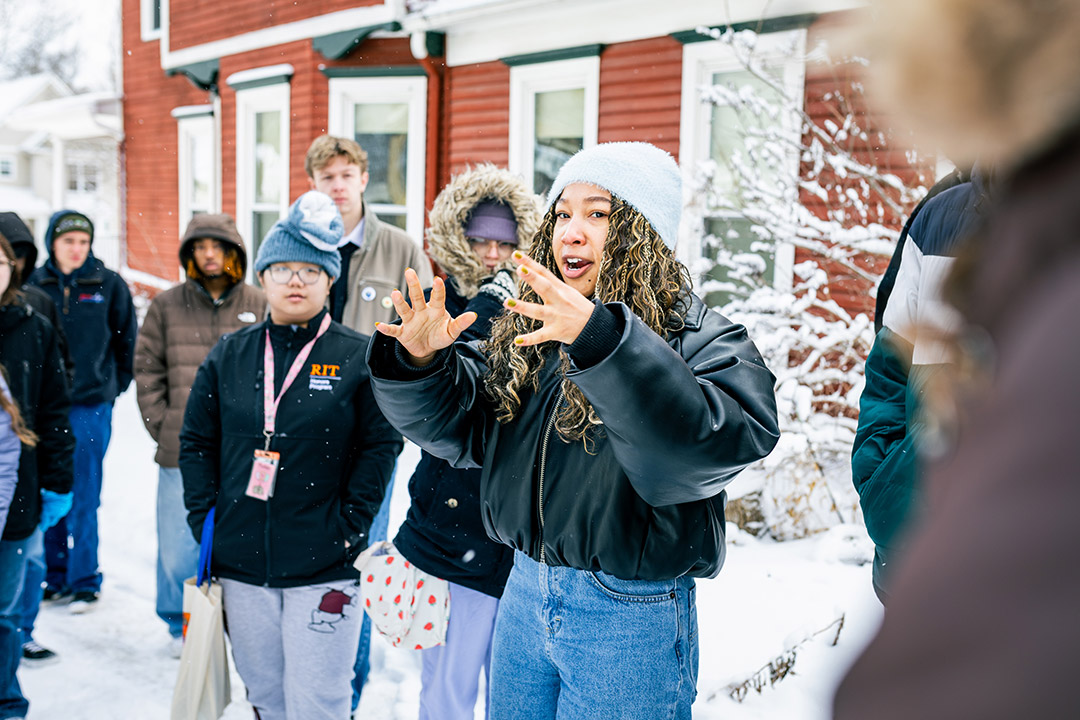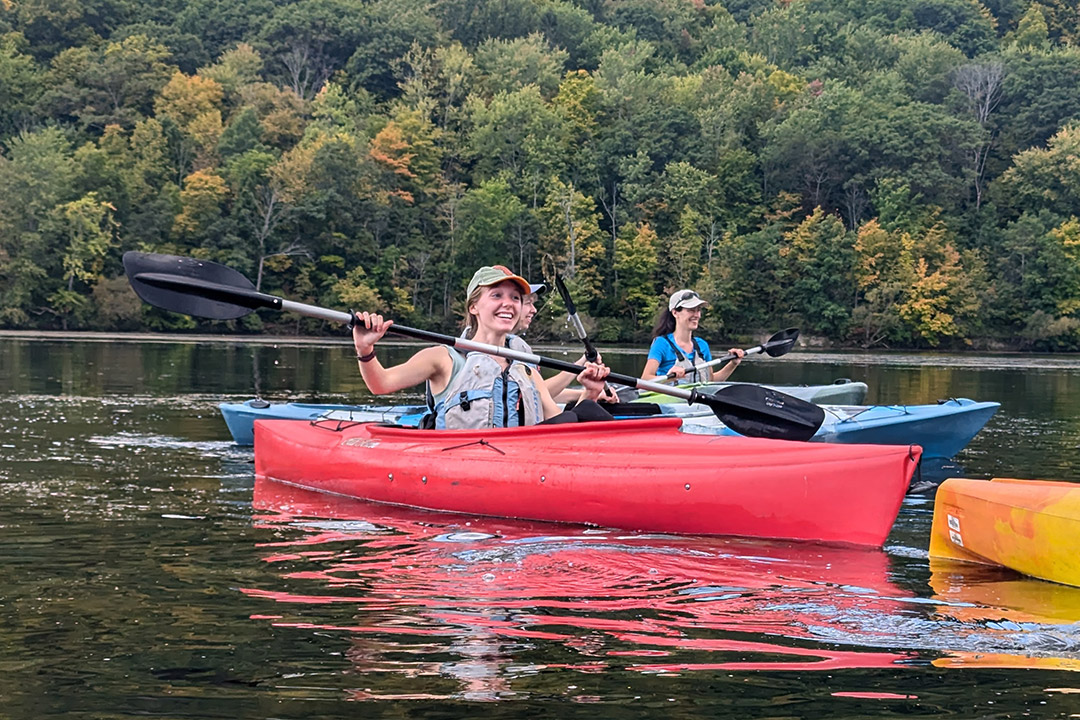Students explore leadership roles in sustainability through RIT pilot program
First-year students prepare to drive change through the RIT Climate and Sustainability Leadership Program
Liam Myerow/RIT
Katie Thomas, director of Community Connections at the Ghandi Institute, speaks with Climate and Sustainability Leadership students during a tour.
Jade Lewis did not expect to spend a weekday morning on a casual walk in the woods, searching for maple trees.
The first-year environmental science major from Scranton, Pa., was standing alongside a group of students as an instructor pointed out subtle differences in leaf shape and bark structure. They were learning about maple sugaring, a process in which sap is collected and made into maple syrup, and how large-scale production impacts the environment.
“At first, I wasn’t sure how this connected to sustainability,” Lewis said. “But then we started talking about the maple sugaring industry and it really made me see how everything ties back.”
For Lewis, moments like this highlight the effectiveness of the RIT Climate and Sustainability Leadership Program. which gives incoming students the tools to eventually lead the charge in sustainability and climate action.
In its inaugural year, the program begins with an orientation at the start of the fall semester and lasts throughout the academic year. It offers an experiential learning approach through interactive workshops, conversations with sustainability advocates, and hands-on activities that challenge students to think critically about sustainability challenges and solutions. The group is carefully selected by RIT Sustainability and comes from a range of academic disciplines, reflecting the idea that sustainability is a universal issue that intersects with business, technology, design, and beyond.
“This program, like many great things at RIT, was designed with a cross-disciplinary approach in mind,” said Neha Sood, director of Sustainability. “Our desire is for students to understand they don’t need to have ‘sustainability’ in their degree program title to make meaningful, positive impact. We believe everyone can play a role in sustainability and climate action work.”
Before joining the Climate and Sustainability Leadership Program, Martin Bassett understood the concept of climate change and sustainability, but it wasn’t at the forefront of his life. The mechanical engineering student from Fort Lee, N.J., applied for the program on a whim. Within weeks of the joining, his perspective began to shift as he met people from various backgrounds.
Provided
First year student Jade Lewis, center, enjoys a day of kayaking on Canadice Lake with Enid Cardinal, Senior Advisor to the President for Strategic Planning and Sustainability, right, and other members of the Climate and Sustainability Leadership Program. Students learned about the history of the Finger Lakes and its significance as the source of freshwater for Rochester.
“There are people from all over—computer science majors, business students, even someone from Alaska,” said Bassett. “I don’t think I’d have met these people otherwise.”
“It’s interesting to hear different perspectives,” Lewis said. “Even though we all cared about sustainability, we like to think about it in different ways.”
Hands-on opportunities give students an escape from the typical cadences of classwork and a chance to explore the Greater Rochester region. Along with learning about maple syrup production, the group has participated in gardening projects at the Tait Preserve and kayaking on Canadice Lake.
“I didn’t know much about gardening, but we learned about the area and how sustainability ties into it,” Bassett said. “It was cool to actually plant something and see sustainability in action instead of just talking about it in a classroom setting.”
On a recent trip, the group went on a tour of Rochester, visiting the site of the future High Falls State Park in Rochester’s downtown area, the Lamberton Conservatory in Highland Park, and the M.K. Ghandi Institute for Nonviolence. The experience provided another opportunity for students to understand how social and economic issues affect sustainability.
“Sustainability can often feel unapproachable to those who aren't directly involved in it,” said Spencer Griebel, a fourth-year cybersecurity and computing and information technologies major and student adviser to the program. “Getting a group of students from a wide variety of backgrounds and introducing them to local community-led sustainability initiatives has led to some great discussion and self-discovery. I think our program is uniquely suited to inspire change-makers by encouraging all types of students to get involved.”
“I always thought the science was the important part,” Lewis admitted. “These trips have helped me to understand how much sustainability is shaped by economics, policy, and how people interact with the environment. We’ve learned a lot about local efforts this year and its taught me to show up, both in Rochester and in my community back in Scranton.”
For Bassett, one of the biggest takeaways so far has been the opportunity to go outside of his comfort zone and add sustainability into his career goals.
“Sustainability is such a relevant topic—especially since I’m studying engineering,” he said. “It’s opened a whole new industry for me to explore. It’s a great way to get my foot in the door for sustainability-focused companies, even in industries like oil and gas that are shifting toward greener solutions. Climate change and global warming affect everyone, so having a program like this is important.”







